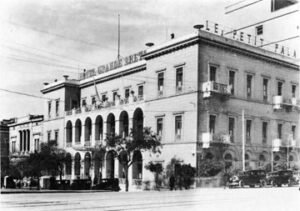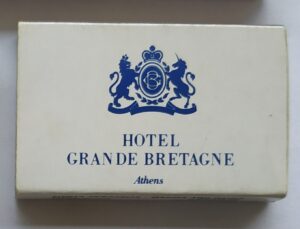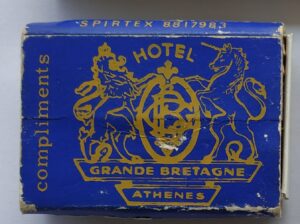
The matchboxes of the “Matchbox Museum” which depict the hotel Great Britain are quite rare.
 This hotel is the most historic in Athens. It was founded in 1866 and initially settled in a building on Stadiou and Karagiorgi of Serbia streets. In 1874 the hotel business was relocated to the Antonis Dimitriou mansion which was built in 1842 and where it is still housed today.
This hotel is the most historic in Athens. It was founded in 1866 and initially settled in a building on Stadiou and Karagiorgi of Serbia streets. In 1874 the hotel business was relocated to the Antonis Dimitriou mansion which was built in 1842 and where it is still housed today.
This building is architecturally part of the early neoclassicism. The architect Theophilos Hansen managed to “break” the strict symmetry with a free organic arrangement of the spaces and with the parallel use of renaissance morphological elements.
Antonis Dimitriou, a wealthy Greek of the Diaspora, buys a large area in Syntagma Square, where he builds at the urging of Otto himself – to decorate the square where the palace was located. This villa, of 1,760 sq.m. and of 90 rooms, it was the first privately owned building in Syntagma Square and was “the second largest after the palace, but surpassing it in luxury”.
In 1878, Savvas Kentros, a grocer and animal trader who now owns the hotel, and Stathis Lampsas, a young palace cook with knowledge of the art of hospitality in France, decide a huge business risk for the time, to take out a loan of 800,000 drachma,. with the ultimate goal of creating a hotel of European standards. In the dark, dusty in summer and muddy in winter Athens of a few tens of thousands of inhabitants, this venture was particularly risky. Characteristic of the difficulty was the fact that at that time the hotel had only two baths for 80 beds. Those who wished to take a bath had to declare it from the previous day and the staff was forced to carry water to the building with buckets from the street water seller.
Stathis Lampsas, a young palace cook with knowledge of the art of hospitality in France, decide a huge business risk for the time, to take out a loan of 800,000 drachma,. with the ultimate goal of creating a hotel of European standards. In the dark, dusty in summer and muddy in winter Athens of a few tens of thousands of inhabitants, this venture was particularly risky. Characteristic of the difficulty was the fact that at that time the hotel had only two baths for 80 beds. Those who wished to take a bath had to declare it from the previous day and the staff was forced to carry water to the building with buckets from the street water seller.
In a short time, “Great Britain” will “become the first hotel in the East”, the most remarkable accommodation in Eastern Europe. In fact, the “Great Britain” was the first building -after the palace- that was electrified, causing the admiration of all.
At the dawn of the 20th century, as Athens developed, “Great Britain” gradually acquired modern amenities, such as water, central heating, telephone and elevator. Later, with the exception of the difficult years of the War, when it was commanded by the Germans, it will continue to be a point of reference for the social, cultural, political and economic life of Athens and consequently of Greece.
In the early days of December, the hotel served as the headquarters of Prime Minister George Papandreou, of the Council of Ministers and British General Ronald Scobby.
 In 1984 it was voted one of the 50 best hotels in the world, while in 2003, on the eve of the Olympic Games, it was closed for almost two years to undergo a radical renovation, the cost of which reached an inconspicuous amount of 112 million euros.
In 1984 it was voted one of the 50 best hotels in the world, while in 2003, on the eve of the Olympic Games, it was closed for almost two years to undergo a radical renovation, the cost of which reached an inconspicuous amount of 112 million euros.
The modernized building now has 384 rooms (79 suites), including 2 Royal Suites of 550 square meters, in which overnight stay costs up to 32,000 euros.

